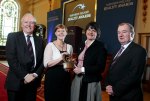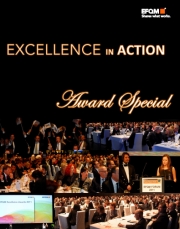
Nacco Plant Manager Alan Little receives a Northern Ireland Quality Award on behalf of Nacco Materials Handling
NACCO Materials Handling led the way for the local business community in a prestigious recognition scheme, winning the Northern Ireland Quality Award alongside three impressive public and voluntary sector organisations.
The Craigavon-based manufacturer of forklift trucks collected the accolade at a lunchtime ceremony in Belfast City Hall alongside the Triangle Housing Association, St Mary’s College in the North West, and the Human Resources, Organisational Development and Chief Executive’s Department at Belfast City Council.
The Northern Ireland Quality Awards recognition process and the gala event are administered by the Centre for Competitiveness (CforC) on behalf of the sponsors: Invest Northern Ireland, Hewlett Packard (HP), the Department of Finance and Personnel, Northern Ireland Electricity, and Translink.

St Mary's College's Northern Ireland Quality Award is collected by Martine Mulhern, Vice Principal
The Northern Ireland Quality Awards measure Northern Ireland’s private, public and voluntary organisations against the globally recognised European and world class performance framework the EFQM Excellence Model.
There are various Levels of recognition throughout the improvement process, and, this year, for the first time, recognition for Gold Star performance in Service Excellence was also presented. (See below for full list of winners).
Congratulating the successful organisations, and encouraging others to follow suit, CforC Chief Executive, Bob Barbour, says:
“Private sector organisations that are committed to the pursuit of quality excellence are leaner, more profitable, more sustainable and more competitive, whilst public sector organisations can be much more cost-efficient and deliver significantly better services. The winners of awards here today illustrate that with their passionate employees, low absenteeism, higher productivity, satisfied customers and superior financial performance.”

Vice Chair of Triangle Housing Association, Noeleen Diver receives the organisation's Northern Ireland Quality Award.
“More than ever, Northern Ireland needs organisations across our economy to passionately pursue quality excellence so that we can maximise the potential of our businesses, improve productivity and achieve a public sector that delivers better with less,” he adds.
Established by the private sector, the Centre for Competitiveness (CforC) is an independent, not-for-profit, membership organisation, dedicated to improving the competitiveness of Northern Ireland at both the regional level and the level of the individual organisations in the Private, Public and Voluntary sectors and to build best in class performance through International Leadership & Innovation, Productivity Improvement, and Quality Excellence in all sectors.
The NI Quality Awards process is based on the world class EFQM Excellence Model, incorporating different levels of recognition.

Peter McNaney Chief Executive , Belfast City Council and Jill Minne – Head of Human Resources, receive the Northern Ireland Quality Award on behalf of Human Resources and Organisation Development Unit , Chief Executive's Department, Belfast City Council
Since 1991, over 30,000 European organisations, large and small, from the private, public and voluntary sectors have used the EFQM Model as their blueprint and driver of competitiveness.
Levels of recognition include: NI Quality Award, Mark Of Excellence, STEPS (Public and Private Sector, Committed to Excellence). The Awards are not an end in themselves but a means of assessing and recognising role model organisations against the most rigorous international quality standards while encouraging management and staff to continue their excellence journey to the next level.
Invest Northern Ireland is the main sponsor of the CforC Gala event. DFP and HP are the sponsors of the Steps to Excellence awards. NIE is the sponsor of the Mark of Excellence Awards. Translink is the sponsor of the Northern Ireland Quality Award.
Full List of Recognised Organisations
Northern Ireland Quality Award Winners
- Nacco Materials Handling
- The Triangle Housing Association
- St Mary’s College in the North West
- The Human Resources, Organisational Development and Chief Executive’s Department at Belfast City Council.
Mark of Excellence
- Malone Lodge Hotel
- Enterprise Shared Services – IT Assist
- Housing Rights Service
- HSC Business Services Organisation – Procurement and Logistics Service
- Ashton Community Trust
Steps to Excellence
- Early Years
- Roe Valley Leisure Centre
- Central Procurement Directorate
- South Eastern Health and Social Care Trust
- Niamh
Gold Star Service Excellence
- Baker Tilley Mooney Moore
- NI Chamber of Commerce
- Airporter
- Radisson Blu
- Boomer
- Legal Island
- Neal Lucas Recruitment
- SLA Mobile
- Institute of Directors
- Clandeboye Lodge Hotel (Role Model Status Awarded)
Information on NI Quality Award Winners
NACCO
NACCO Materials Handling based in Carn Industrial Estate, Craigavon, is part of the NACCO Materials Handling Group (NMHG) which has its headquarters in Portland, Oregon. NMHG is one of 4 operating subsidiaries of NACCO Industries, Inc. operating out of Cleveland, Ohio. This holding company has revenues of $2.7 billion employing 8,900 people worldwide.
NMHG operates in 3 geographic theatres namely Europe, Middle East & Africa (EMEA), Americas and Asia-Pacific. NMHG’s overall strategy is to manufacture volume product in the market of sale. In EMEA Hyster and Yale forklift trucks with lifting capacities ranging from 1 to 52 Tonnes are manufactured and marketed. These are manufactured within 3 plants; one based in Northern Ireland, one in Italy and one in Holland. Spare parts for other manufacturers under the Hyster Multiquip and Yale Premier Parts brands are also marketed.
Key Strengths
- NACCO has a results orientated culture, where measurement is captured in a Balanced Scorecard format. Corporate Scorecard is cascaded to departmental and individual level, and is aligned with the Performance Management System.
- Leaders of the organisation are passionate about the business, operate with a shared sense of purpose and drive to deliver and succeed. They expect the same approach from peers and reportees. They are a visible team, walking the talk, and an open door policy exists.
- The company has in place robust systems, clearly defined processes with process owners, where metrics and targets are cascaded from Corporate to individual level, and aligned vertically and horizontally.
Demand Flow Technology is the manufacturing system in place, where a pull system drives production. The system is regularly audited by teams from sister plants. “Effectivity” measurement is evident across all functional areas.
- A high level of empowerment is evident across all areas. Self managed teams, cross-functional teams, and a culture of continuous improvement all encourage engagement from all. The company has IIP Gold status, and several National Training Awards
- ISO14001 was achieved in 2002, with annual improvement targets and objectives agreed, measured and monitored. Key environmental measures include waste segregation and minimisation, energy efficiency and reduction programmes, and carbon footprint measurements.
- Sustained high level of performance for key operational indicators
– on-time performance
– non-conformance per truck shipped
– absenteeism levels
– cost of non-conformance
– % first time through
St Mary’s College
St Mary’s College is an all girls’ Catholic all ability school. It has moved to a brand new building at Northland Road in September 2010 after being in the Creggan area of Derry for 50 years. It is a PPP school and has specialist status in Science. With a staff of 97, it caters for the educational needs of 871 pupils of which 46% are entitled to Free School meals. The School recognises that the educational future of Northern Ireland is uncertain, nevertheless they are committed to finding ways of making the curricular provision sensitive to the needs and abilities of all their pupils now and in the future so that every pupil can achieve her personal best and progress.
It is clear that St Mary’s is an organisation with a clear commitment to its continuous improvement journey. There is strong evidence to suggest that the organisation sees the important link between its commitment to the quality journey it has embarked upon and its commitment to educate and fully develop its learners.
Key Strengths
- The Principal and Senior Management Team have a strong communication ethos, with the members of the senior management team operating an open door policy and being “visible” to staff.
- The success of St Mary’s depends on their customers (i.e. their learners) and they are focused on understanding current and future learner needs, meeting learner requirements and striving to exceed expectations of the learners and their parents. St Mary’s commitment to customer service has been externally validated through a detailed process of self evaluation, ETI audit reports and attainmnet of IiP.
- The Culure of the organisation is a can do attitude, and everyone has a sense of pride in the work of the school. There is dedicated staff at all levels within the school. People are clear on what is expected of them and they enjoy their work. They are clear on their roles and responsibilities and of their contribution to achievement of the objectives within the overall planning process.
- St Mary’s has used its specialist science status to provide a centre of excellence in scientific, technological, enterprising and vocational education. They have also been selected as one of only 100 schools from across the globe to join Microsoft’s Partners in Learning for Schools programme. They are the first school in NI to be named a Microsoft Mentor School.
Triangle
Triangle is a registered housing association with the Department for Social Development in Northern Ireland and a non-profit making charity, providing supported accommodation, family housing and specialised care and support services for tenants across Northern Ireland. Triangle is a progressive service provider, promoting social inclusion through a range of strategic partnerships. It is a member of the Northern Ireland Federation of Housing Associations (NIFHA). Triangle has the 6th largest turnover and is the 3rd largest employer within the NI housing association sector. Triangle’s turnover has increased from £5.5 million in 2006/07 to a projected £8 million for 2011/12. Triangle has major investments in social housing which have increased by 92% from £19.7m in 2006/07 to £37.9m in 2010/11.
Triangle uses various continuous improvement initiatives, including the EFQM Excellence Model and is a NI Quality Award Prize Winner. The organisation also holds the Investor in People Silver status, ISO 9001: 2008, Customer Service Excellence award, Employer of Choice award and was the first organisation in Northern Ireland to be awarded the Health and Well Being Good Practice Award. Triangle was also one of the first organisations to sign up for the Gold Standard on Domestic Violence in the Workplace and the Charter and Best Practice Guidelines for employing migrant workers in NI in partnership with Business in the Community and OFMDFM.
Triangle has also achieved a number of positive results from its regulators including an overall “good” rating by the DSD in its most recent inspection; a grade B or higher in all supported housing services against the NIHE Supporting People Quality Assessment Framework (QAF) and high level compliance against the Regulatory Quality Improvement Authority (RQIA) standards.
Key Strengths
- Triangle have a fully embedded Balanced Scorecard and measure organisational success in terms of finance, stakeholders, people and processes.
- Triangle has a very strong User based service improvement and User Centred ethos, this ethos is central to service delivery, service innovation and product quality (Housing Stock).
- The Management Team and Board are committed to the ethos of continuous improvement which is exemplified through the organisations clearly defined vision, mission and values, the use of the EFQM Excellence Model and self assessment, as well as the achievement of various awards, e.g. ISO, IIP, Employer of Choice.
- There is good evidence that the values of the organisation are embedded – for example in the Code of Conduct, Customer Charter, and Equal Opportunities Policy – and ‘lived’, for example various Tenants/Service User Forums, levels of staff participation in improvement, proactive inclusion of service user input into service delivery and development.
There is evidence of the organisations systematic approach to managing through measurement and key processes. Triangle has implemented ISO9001, which has since been fully embraced.
Triangle has a culture of inclusiveness and participation; staff at different levels are
involved in improvements and make positive contributions and suggestions. Triangle staff has a strong sense of job satisfaction and motivation. They are supported to make decisions within their roles and have an obvious pride in the work that they do.
Belfast City Council’s HR and Organisation Development Team
Belfast City Council recognises the impact the economic downturn is having on local people, communities and businesses. The downturn has affected many sectors and the challenge is considerable, but the next few years will witness a number of important milestones for Belfast. A number of key tourist attractions and cultural venues such as Titanic Belfast and the MAC will open and major international events, such as the Tall Ships in 2009 and the 2011 MTV Europe Music Awards, have helped to boost our economy and enhance Belfast’s international reputation.
The Council employs over 2500 people and spends £170 million, much of it locally, each year. The HR function of Belfast City Council plays a key role in supporting the organisation to maximise the use of its resources to help stimulate the local economy and at the same time minimise the cost to the ratepayer.
The HR and Organisational Development Team reports directly to the Chief Executive and firmly believes that the people who work for the Council are at the heart of delivering value for money services to the rate payers of Belfast and meeting elected members’ vision and ambition for the future.
The team helps to build the capacity of the Council to meet the challenges ahead and supports a planned and systematic approach to improvement through:
- Developing and maintaining a performance driven culture – setting clear, ambitious, measurable and achievable goals.
- Establishing strong and meaningful core values and behaviours
- Creating a culture of transparency, openness and trust
- Maintaining good and long-term relationships with partners and stakeholders
- Championing diversity and supporting a diverse workforce
- Striving to be a best-practice organisation and employer of choice
- Ensuring equal pay and a fair organisation and reward structure
- Supporting highly effective internal communications and engaging and involving the workforce.
- Being a learning organisation – sharing information, knowledge and best practice
- Developing effective, focused and strong leaders
- Making a significant contribution to the Council’s efficiency programme
- Continuously improving people management policies and processes and developing flexible working practices
For further information on using the EFQM model to improve your business or organisation contact George Wilson on 028 90737950 or email compete@cforc.org
Filed under: Uncategorized | Leave a comment »






 The world has changed a lot since December 2010. The past year, 2011 has been a difficult year for the many with a few exceptions. The Centre, while continuing to promote the private sector voice for Competitiveness and provide a unique leadership function, has not been immune to the recession and cost cutting.
The world has changed a lot since December 2010. The past year, 2011 has been a difficult year for the many with a few exceptions. The Centre, while continuing to promote the private sector voice for Competitiveness and provide a unique leadership function, has not been immune to the recession and cost cutting.







 The Centre for Competitiveness has opened up a contact base in Shanghai with a small firm “LIPAU” involved in exhibitions, support and sourcing. The Chief Executive Lili Tang is married to a local man from the Limavady area. (They live between both locations so his wife can keep her Chinese passport). Arrangements can be made to meet either of them if requested.
The Centre for Competitiveness has opened up a contact base in Shanghai with a small firm “LIPAU” involved in exhibitions, support and sourcing. The Chief Executive Lili Tang is married to a local man from the Limavady area. (They live between both locations so his wife can keep her Chinese passport). Arrangements can be made to meet either of them if requested.
You must be logged in to post a comment.